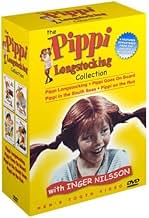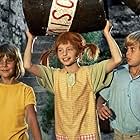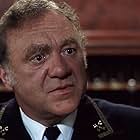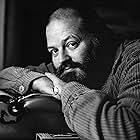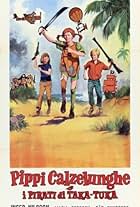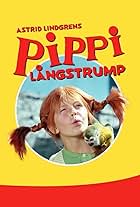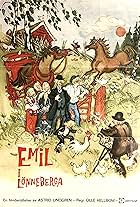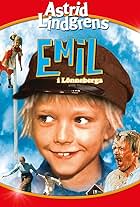VALUTAZIONE IMDb
6,9/10
3098
LA TUA VALUTAZIONE
Le ulteriori avventure della ragazza super forte Pippi Calzelunghe e dei suoi amici Tommy e Annika in questo sequel della classica serie TV svedese.Le ulteriori avventure della ragazza super forte Pippi Calzelunghe e dei suoi amici Tommy e Annika in questo sequel della classica serie TV svedese.Le ulteriori avventure della ragazza super forte Pippi Calzelunghe e dei suoi amici Tommy e Annika in questo sequel della classica serie TV svedese.
Trama
Lo sapevi?
- QuizDespite this film being advertised as "Pippi Longstocking's third great adventure" in the US, this is actually the second film, a direct sequel to Pippi Calzelunghe e il tesoro di capitan Kid (1969), with more material from the TV series not included in that film. This was the third film presented in the US in 1975 (the second being the actual third film, Pippi Calzelunghe e i pirati di Taka-Tuka (1970) in 1974). Some US video/movie guides have even listed this as the final film in the series, which it wasn't. (The fourth and final film was Quella Strega di Pippi Calzelunghe (1970), released in the US in 1977.)
- BlooperWhen Pippi hurls the giant snowball towards the burglars, the sky alters between sunny, overcast, and twilight.
- Curiosità sui creditiIn the German version, at the closing freeze frame of Pippi playing a trumpet, a male voiceover announces that Pippi will return in "Pippi Langstrumpf auf Taka-Tuka-Land" (the German release proto-title for Pippi Calzelunghe e i pirati di Taka-Tuka (1970); its actual title there would be "Pippi in Taka-Tuka-Land"), the title of which appears over the freeze frame before the film fades to black (with a big finish arrangement of the "Here Comes Pippi Longstocking" theme playing over the black screen).
- Versioni alternativeThe aspect ratio is altered to 1.78:1 (16:9) in some DVD and Blu-ray releases.
- ConnessioniEdited from Pippi calzelunghe (1969)
- Colonne sonoreHey, Pippi Langstrumpf!
("Hey, Pippi Longstocking")
Main Title Theme
Based upon "Här Kommer Pippi Långstrump" ("Here Comes Pippi Longstocking")
Composed by Jan Johansson (original) and Konrad Elfers
Lyrics by Astrid Lindgren (original), Wolfgang Franke, and Helmut Harun
Performed by Eva Mattes
Recensione in evidenza
PIPPI GOES ON BOARD (known in Germany as DIE NEUESTEN ABENTEUER VON PIPPI LANGSTRUMPF: PIPPI GEHT VON BORD/THE NEWEST ADVENTURES OF PIPPI LONGSTOCKING: PIPPI GOES ON BOARD), the second German compilation film of the 1969 Swedish PIPPI LONGSTOCKING TV series (which I reviewed elsewhere here on IMDb), is admittedly a mixed bag on one level. If you remember, the first PIPPI LONGSTOCKING compilation film is basically a cut & paste pastiche of most of the best parts of the TV series (on the intent of making that the ultimate Pippi film), right? Well, PIPPI GOES ON BOARD further capitalizes on its success by taking the *leftover* best parts from the series! If you're used to the series and its solid structure, the result is somewhat of a mess.
On the other hand, this film is a major improvement over the first film on another level, as the English dubbing uses real kids to do the dubbing voices of Pippi (Inger Nilsson) and her pals Tommy (Pär Sundberg) and Annika (Maria Persson)! Despite their obvious New York accents (all of the films from this point on were dubbed in NY; I think the first was dubbed in California; either way, the distribution for all four was handled by the Boston-based film distribution company, G.G. Communications), the children voice actors did a great job, and lent much needed charm to the characters they performed. Fred Ladd, best known for bringing classic anime shows (ASTRO BOY, GIGANTOR, etc.) to the US, takes over the dubbing for the series from this point forward, and you'll recognize some of the adult voice actors here, too! (Some are veterans at Titra Studios on the dubbing for various Japanese sci-fi film classics.) The funny thing is, the US dub got the policemen Kling (Ulf G. Johnsson) and Klang (Göthe Grefbo)'s names mixed up! Despite that, veterans Gil Mack and Ray Owens ("Klang" and "Kling," er, Kling and Klang, respectively) did a great job dubbing their voices. And from this point onwards, Captain Longstocking (Beppe Wolgers) has the voice of a classic Italian movie Hercules than the, well, Italian accent he got in the first film!
This film's music score is done by German composers Konrad Elfers (who scored the previous film), and Christian Bruhn, who turns up very good music and songs that compare quite well with the works of original Swedish composer Georg Riedel. While the German version uses Elfers' same arrangement of Jan Johansson's "Here Comes Pippi Longstocking" (AKA: "Hey, Pippi Longstocking!") in the opening credits, the US version uses a whole new rearrangement, which I like even better! This new arrangement of the theme song (with lyrics by E. Jonny Graff and Lenny Whitcup) recalls the tune for the classic Tootsie Roll animated commercials, and is sung by little kids. It's really cute!
Now, let's consider this film's title. The climax/ending of the last film (which really *should've* been the climax/ending of this film, as in the book of the same title) is put at the beginning as a flashback, so the extracted material from the series used in this film is totally retconned! In a way, that's actually funny. Probably so much so that the movie was retitled HERE COMES PIPPI LONGSTOCKING (HÄR KOMMER PIPPI LÅNGSTRUMP) when released in Sweden! I gather that it must've been Astrid Lindgren's decision, as it would have been rather a deviation of the book it was based on.
But I'll admit it; despite this film being the weaker of the films, it's definitely *not* unwatchable. We still get great Pippi fun in this film! You'll see a lot of great moments you never got to see in the first film. And, as I said, with much better dubbing! It's very entertaining, even very touching.
The first half of the film uses Episodes 13, 3, 4, 5, 11, and 2 (in that order), which are practically cut and pasted all over the place, but we get a far more consistent flow with the usage of Episodes 6, 7, and 8 in the second half.
In summary, I still recommend this film very highly! It is best seen as a double-feature with the first PIPPI LONGSTOCKING film. Of course, this movie would be followed by the two feature-length movie sequels to the TV series, PIPPI IN THE SOUTH SEAS and PIPPI ON THE RUN!
On the other hand, this film is a major improvement over the first film on another level, as the English dubbing uses real kids to do the dubbing voices of Pippi (Inger Nilsson) and her pals Tommy (Pär Sundberg) and Annika (Maria Persson)! Despite their obvious New York accents (all of the films from this point on were dubbed in NY; I think the first was dubbed in California; either way, the distribution for all four was handled by the Boston-based film distribution company, G.G. Communications), the children voice actors did a great job, and lent much needed charm to the characters they performed. Fred Ladd, best known for bringing classic anime shows (ASTRO BOY, GIGANTOR, etc.) to the US, takes over the dubbing for the series from this point forward, and you'll recognize some of the adult voice actors here, too! (Some are veterans at Titra Studios on the dubbing for various Japanese sci-fi film classics.) The funny thing is, the US dub got the policemen Kling (Ulf G. Johnsson) and Klang (Göthe Grefbo)'s names mixed up! Despite that, veterans Gil Mack and Ray Owens ("Klang" and "Kling," er, Kling and Klang, respectively) did a great job dubbing their voices. And from this point onwards, Captain Longstocking (Beppe Wolgers) has the voice of a classic Italian movie Hercules than the, well, Italian accent he got in the first film!
This film's music score is done by German composers Konrad Elfers (who scored the previous film), and Christian Bruhn, who turns up very good music and songs that compare quite well with the works of original Swedish composer Georg Riedel. While the German version uses Elfers' same arrangement of Jan Johansson's "Here Comes Pippi Longstocking" (AKA: "Hey, Pippi Longstocking!") in the opening credits, the US version uses a whole new rearrangement, which I like even better! This new arrangement of the theme song (with lyrics by E. Jonny Graff and Lenny Whitcup) recalls the tune for the classic Tootsie Roll animated commercials, and is sung by little kids. It's really cute!
Now, let's consider this film's title. The climax/ending of the last film (which really *should've* been the climax/ending of this film, as in the book of the same title) is put at the beginning as a flashback, so the extracted material from the series used in this film is totally retconned! In a way, that's actually funny. Probably so much so that the movie was retitled HERE COMES PIPPI LONGSTOCKING (HÄR KOMMER PIPPI LÅNGSTRUMP) when released in Sweden! I gather that it must've been Astrid Lindgren's decision, as it would have been rather a deviation of the book it was based on.
But I'll admit it; despite this film being the weaker of the films, it's definitely *not* unwatchable. We still get great Pippi fun in this film! You'll see a lot of great moments you never got to see in the first film. And, as I said, with much better dubbing! It's very entertaining, even very touching.
The first half of the film uses Episodes 13, 3, 4, 5, 11, and 2 (in that order), which are practically cut and pasted all over the place, but we get a far more consistent flow with the usage of Episodes 6, 7, and 8 in the second half.
In summary, I still recommend this film very highly! It is best seen as a double-feature with the first PIPPI LONGSTOCKING film. Of course, this movie would be followed by the two feature-length movie sequels to the TV series, PIPPI IN THE SOUTH SEAS and PIPPI ON THE RUN!
- ryuuseipro
- 18 lug 2011
- Permalink
I più visti
Accedi per valutare e creare un elenco di titoli salvati per ottenere consigli personalizzati
- How long is Pippi Goes on Board?Powered by Alexa
Dettagli
- Tempo di esecuzione1 ora 23 minuti
- Mix di suoni
- Proporzioni
- 1.37 : 1
Contribuisci a questa pagina
Suggerisci una modifica o aggiungi i contenuti mancanti

Divario superiore
By what name was Pippi a bordo! (1969) officially released in Canada in English?
Rispondi

